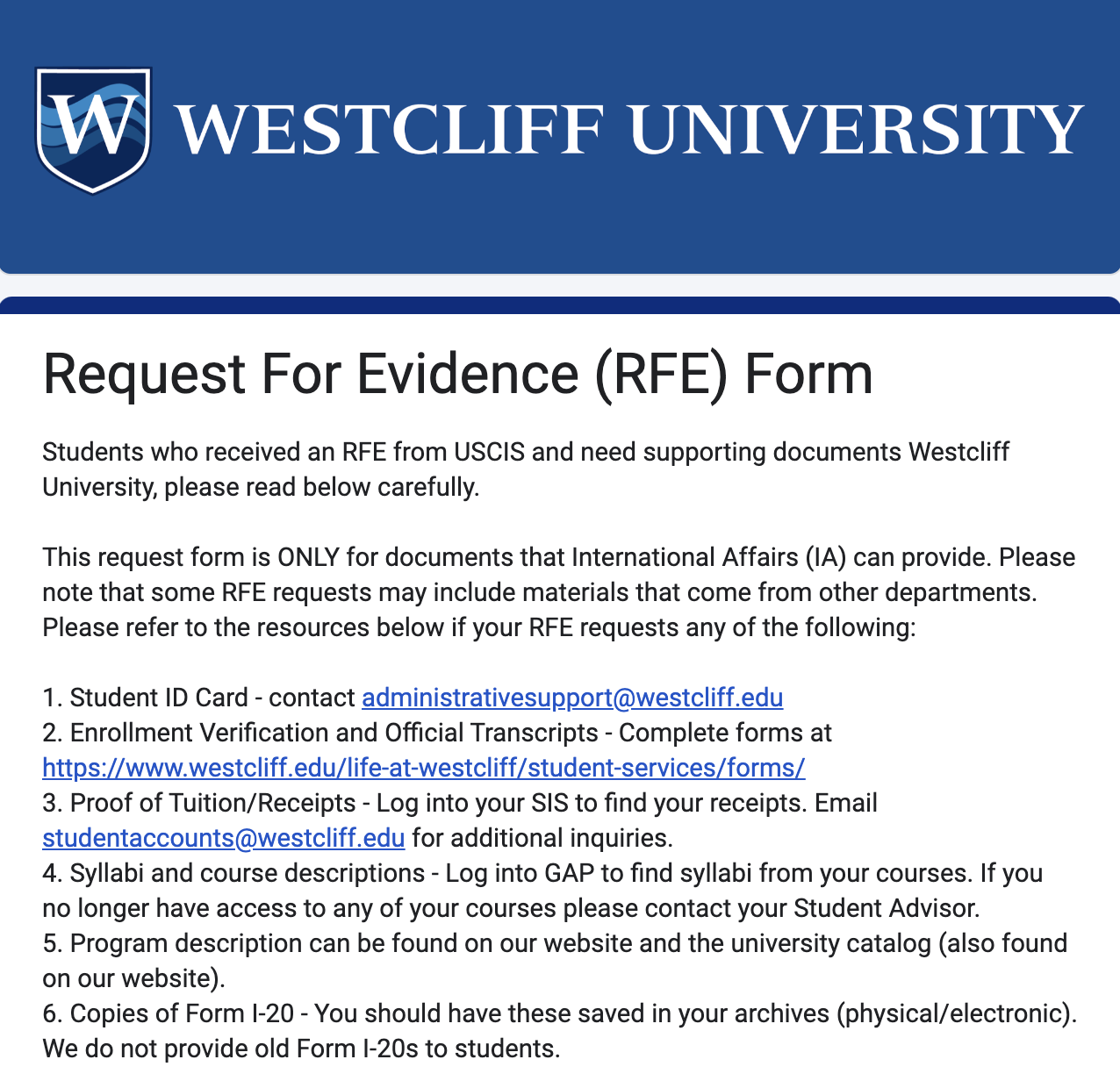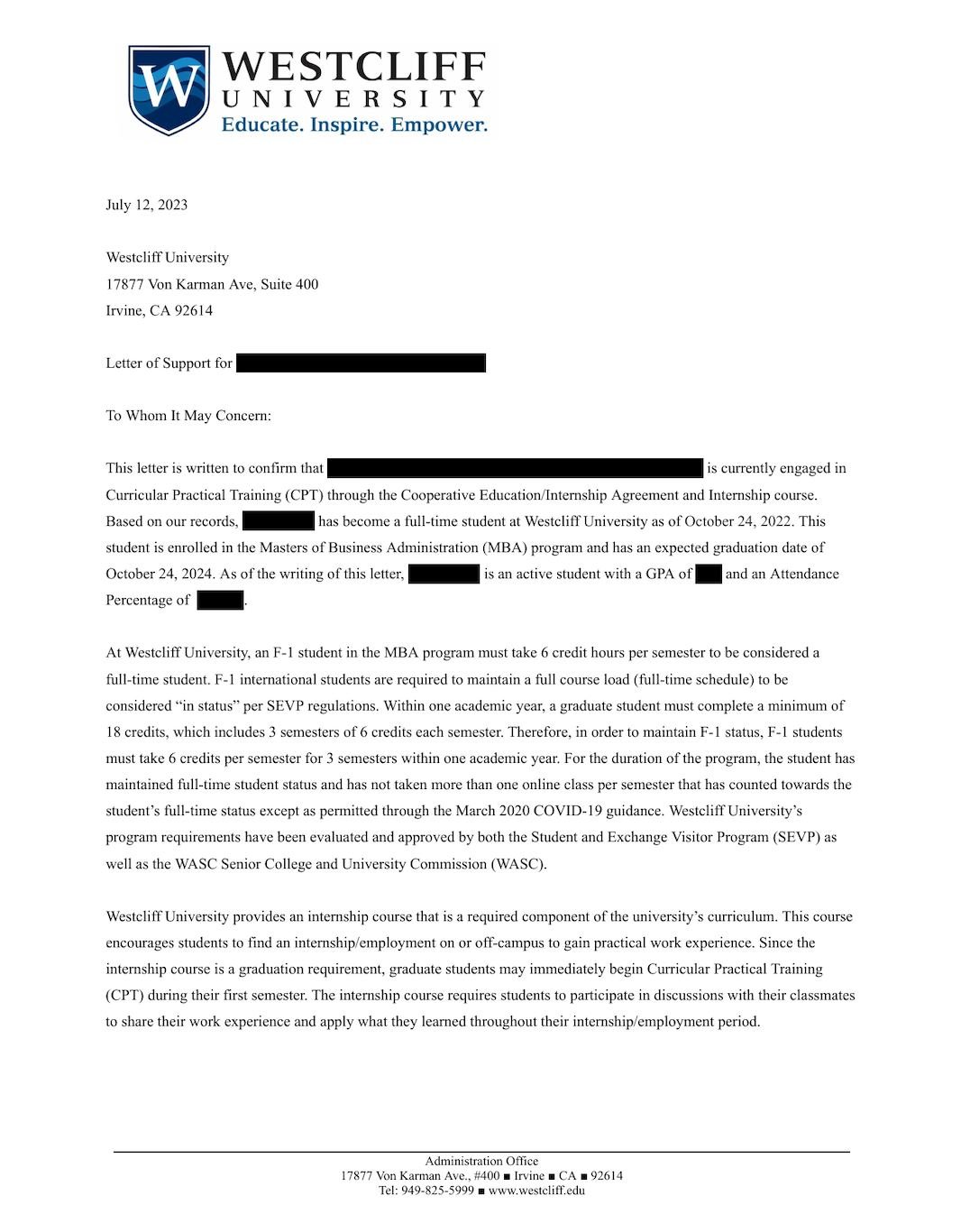Being enrolled in a second Master's program or a Day 1 CPT university can raise a few anxieties, particularly about the possibility of receiving an RFE (Request for Evidence) while applying for an H1B visa. Although such a situation may not be ideal, understanding the nuances of this RFE and ensuring all necessary documentation is prepared to respond to it can make it less daunting. Here are the best practices to effectively address a Day 1 CPT H1B RFE.
What is an RFE?
Its Relationship to Day 1 CPT
Docs you need
What can you do to stay prepared?
Common questions of Day 1 CPT RFE
Day 1 CPT RFE common questions and how to answer
Day 1 CPT Universities Support
What Day 1 CPT Universities can do for you?
What is an RFE? What is its Relationship to Day 1 CPT
Let's start with the basics. An H1B RFE is a Request for Evidence issued by USCIS (United States Citizenship and Immigration Services) if you are enrolled in a Day 1 CPT program. Typically, if you're staying in the territory of the U.S. at the time of filling an H1B application, your employer, who sponsors your H1B, needs to file a change of status for you. As a master's student, your current immigrant status would be an F1 student visa. However, being enrolled in a Day 1 CPT program means you're working while studying.
It's fairly common to be studying in one city and working in another as a part of the CPT program. The program often requires you to attend in-person classes on a weekly, bi-weekly, monthly, or 12-weekly basis, depending on its structure. When your employer requests a change of status along with your H1B visa, they're essentially asking USCIS to shift your legal status from a student/F1 Visa to an H1B work visa without the need for you to travel outside the US.
The condition to achieve an automatic change of status without leaving the US is your compliance with your current legal status in the country. Based on the trajectory of your study and work, the USCIS might raise concerns about your compliance with your F1 status and demand evidence through an RFE.
What Can You Do To Stay Prepared?
To validate your enrollment in Day 1 CPT universities, seek assistance from your school, employer, and yourself. Gather documents during your studies:
From your university
- RFE Support Letter
- Attendance Report
- CPT Corporate Agreement
- Enrollment Verification
- Official Transcript
- Academic Record
- Tuition Record
From your Employer
- Payroll record
- Job Description
- Offer Letter
By yourself
- i-20 (s)
- Travel records, such as parking tickets, gas receipts, train/plane tickets, etc.
- Study-related spending records, such as receipts for textbooks, software, etc.
- Syllabus, handouts
- Homework samples, study plan, study notes
- Record of you using university email to receive and send messages regarding your study
- Prove of address (i.e. utility bill, credit card statement, lease agreement or mortgage statement, etc.)
Difficulty: ☆
This is a standard question touching upon the nature of your CPT requirement. If you enrolled in an accredited Day 1 CPT university, your university should be able to help you with this. CPT requirement was set as a part of your curriculum by the school. As a student, you are simply following their requirements. It is the school who should and in most cases have proved the relevancy between CPT and the degree to USCIS or other agencies.
Difficulty: ☆
You should be fine if you select your Day 1 CPT major using the guide we provided. It follows the same logic, which requires your JD to match your Day 1 CPT courses’ description. For how to choose Day 1 CPT major to avoid RFE, read here.
Difficulty: ☆
Per pare to provide your CPT application material, including your CPT agreement.
Difficulty: ☆
Not too different from the second question. If you can find descriptions in your course syllabus that perfectly matches your job description, that would be the best.
Difficulty: ☆☆
This question is a bit tricky. It meant figuring out if you had a job first and merely using an F1 visa to stay in the U.S. while working on CPT authorizations. CPT or not, as an F1 visa holder, your primary identity is a student from the perspective of a USCIS officer. Who helped you get the job is not too important. The course requires you to have internship experience, therefore, you have one. Most accredited Day 1 CPT universities provide career assistance since CPT is a mandatory component of the degree.
Difficulty: ☆
If your employer allows you to use CPT as a type of work authorization, they usually will help you through this by providing sufficient documentation. This should be an easy problem to tackle.
Difficulty: ☆
Provide documents that record your attendance, homework, GPA, etc.
All these should be included in your RFE package that is provided by your Day 1 CPT universities.
Difficulty: ☆
Simple paperwork.
Difficulty: ☆
Payment receipts should do.
Difficulty: ☆
keep all records related to your study with you, including syllabus, enrollment letter, homework, receipts for buying textbooks, etc.
Difficulty: ☆☆
Demonstrate your class attendance by providing items such as attendance records, parking or transportation tickets, photographs with friends on campus, and receipts for textbooks and other related materials. Remember to collect these pieces of "evidence" while studying at Day 1 CPT universities.
Difficulty: ☆
Simple paperwork.
difficulty: ☆☆
Once again, it touches on the issue of your intention of being in America. Your syllabus, and class plan should work.
Difficulty: ☆
If you have attended online sessions, your advisor should have a record. This record shall be included in the so-called “RFE package” which is commonly provided to students to deal with RFE.
What Can Day 1 CPT Universities Do for You?
If you possess all the necessary documentation according to the RFE, your employer or immigration attorney will provide a response to the Day 1 CPT RFE, along with evidence to address any change of status queries. Upon approval of the H1B, your status will be seamlessly transitioned to the H1B visa status. This shift will occur without the necessity for you to leave the United States.
Almost all accredited Day 1 CPT universities will help you throughout this process and even prepare the documents for you. For example, Westcliff University and Trine University both have an online portal that allows students to submit an RFE form. Once it was submitted, your DSO or designated advisor will contact you and give you a so-called RFE package, which includes almost all “evidence” mentioned in the above question lists.
Accredited Day 1 CPT universities usually have more experience dealing with RFE as well as more reputable names, which may help you avoid RFE to start with.
These universities treat RFE seriously. If you, unfortunately, received an RFE notice, don’t panic. Contact your DSO or advisor as soon as possible. GoElite has established a partnership with the day 1 CPT universities we represent and has designated school officials to work with us. Our students’ cases are prioritized. If you enrolled in any of the day 1 CPT universities we represent through us, you are more than welcome to contact us for help even after enrollment.
We have student service representatives to help our students deal with CPT applications, RFE, and other issues they may run into after enrollment.

Westcliff University’s online platform for submitting requests for help when facing anRFE

RFE Support Letter Student Got from Westcliff University
We only cooperate with trustworthy universities, and we are the exclusive partner of Concordia University Texas (CTX). Feel free to directly reach out to CTX's DSO team and ask for advice!
We have student service representatives to help our students deal with CPT applications, RFE, and other issues they may run into after enrollment. Contact us if you need help!
We only cooperate with trustworthy universities, and we are the exclusive partner of Bay Atlantic University. Feel free to directly reach out to BAU's DSO team and ask for advice!
We have student service representatives to help our students deal with CPT applications, RFE, and other issues they may run into after enrollment. Contact us if you need help!
Day 1 CPT Universities - Free Consultation
Latest News - Day 1 CPT & Day 1 CPT Universities
-Feb-11-2026-11-06-24-7751-PM.png)
Will a Second Master’s Be Restricted? Top Day 1 CPT Doctorate Programs to Consider in 2026

2026 H-1B Season: 4 Mistakes to Avoid Under Wage-Weighted Selection

H-1B Wage-Level Weighted Lottery Is Now Final: What the New Rule Means for FY 2027

